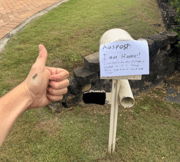
Anthony Albanese discovered what millions of Australians may not yet realise—your 'private' phone number might not be private at all. The Prime Minister's personal mobile was recently found on a US website after being swept up by artificial intelligence that scours the internet for contact details, and he's far from alone in this digital privacy nightmare.
The latest research shows that 77 per cent of employees paste data into AI tools, with an average of 14 pastes per day via personal accounts, and at least three containing sensitive data.
This seemingly innocent activity is feeding a massive data collection machine that's harvesting Australian phone numbers, email addresses, and personal details on an industrial scale.
The invisible data harvesters
These aren't traditional hackers breaking into systems. Instead, AI-powered scrapers crawl websites, social media platforms, and professional networks, collecting any publicly visible contact information they can find.
Think of it as having thousands of digital assistants working around the clock, copying down every phone number, email address, and personal detail they spot online.
The scrapers don't just grab what you've intentionally made public either. Recent discoveries show that thousands of private AI conversations have been indexed by Google, containing entire chat histories including sensitive, private, and potentially regulated data.
What you thought was a private conversation with ChatGPT might now be searchable online.
'The scraped information is then compiled to create an entry on the site's database, effectively creating a digital phonebook'
How AI contact scrapers work
These automated tools scan millions of web pages daily, looking for patterns that indicate contact information. They check LinkedIn profiles, company websites, social media posts, and even online directories. When they find a phone number or email, it gets added to a massive database that can contain hundreds of millions of entries.
Your data is likely already out there
The scale of this data collection is staggering. The website that exposed the Prime Minister's number contains hundreds of millions of entries, including other world leaders like Donald Trump and Emmanuel Macron.
But it's not just politicians at risk—ordinary Australians are caught up in these digital dragnet operations.
Recent security research uncovered one database containing data from over 400,000 users, including 43 million messages and 600,000 images.
Another investigation found that exposed servers are already indexed by major search engines, making it easy for hackers to find vulnerable data that 'may result in significant reputational risks and may negatively impact a person's mental health, life, and safety'.
Professional networking site LinkedIn appears to be a particular target. Despite the platform's claims that user data is protected, multiple services openly advertise their ability to extract 'publicly available phone numbers from LinkedIn profiles' for business purposes.
Why seniors face extra risks
If your personal details have been scraped and compiled, you become a target for scammers who now have verified, up-to-date contact information.
They can use these details to make their approaches seem more legitimate, knowing exactly how to reach you and potentially having additional personal information to make their scams more convincing.
Seniors are particularly vulnerable because scammers often specifically target older Australians, and having access to verified contact details makes their job easier. With your real phone number, scammers can:
- Call you directly rather than using random dialling
- Cross-reference your details across multiple databases
- Build a profile of your online activity and interests
- Use your information to target friends and family members
Taking back control of your data
While you can't completely stop AI scrapers from accessing publicly available information, you can significantly reduce your exposure:
LinkedIn privacy review:
- Log into your LinkedIn account and go to Settings & Privacy
- Under 'Visibility,' change who can see your contact information
- Set your profile to be visible only to logged-in LinkedIn members
- Remove your phone number entirely if you don't need it for professional purposes
Regular digital housekeeping:
- Search for your name and phone number online periodically
- Contact websites directly to request removal of your information
- Be cautious about what contact details you share on any platform
- Consider using alternative contact methods for online accounts
Stay alert to the warning signs:
- Unexpected calls from unknown numbers that seem to know personal details about you
- Emails or messages that reference information you don't remember sharing publicly
- Increased spam or scam attempts after joining new online platforms
Did you know?
Did you know?
The European Union's AI Act, which came into force in August 2024, assigns AI applications to risk categories, with high-risk applications like data scraping tools subject to specific legal requirements. Australia is considering similar legislation, but current protection relies mainly on existing privacy laws.
The authorities are taking notice
The discovery of the Prime Minister's phone number has prompted government action. Companies like Salesforce are now implementing 'Trusted URL allowlists' to prevent malicious data extraction, while major cloud providers are launching tools to help website owners charge AI scrapers for accessing their content.
However, the cat-and-mouse game between data harvesters and privacy protections continues. Even when websites explicitly block AI scraping through technical measures, some scrapers continue to collect data anyway.
Security experts hope 2025 will be remembered as a starting point for compliance regulations in the AI landscape, as current security and privacy concerns are often treated as secondary priorities by AI companies rushing to market.
Protect yourself from AI data scraping
- Review and tighten privacy settings on all social media and professional platforms
- Limit the personal information you share publicly online
- Regularly search for your details online and request removal where possible
- Report suspicious contact attempts to the Australian Cyber Security Centre
- Consider whether you really need to share your phone number on professional platforms
Fighting back against digital data harvesting
The Albanese incident represents just the tip of the iceberg in a much larger privacy crisis. AI tools offer workplace advancements but introduce real-world risks of data exposure that require a balanced, proactive strategy involving clear policies, employee education, and active monitoring.
For individual Australians, especially seniors who may be less familiar with constantly evolving privacy settings, the key is staying informed and taking practical steps to limit exposure.
While we can't completely opt out of the digital world, we can be smarter about how we participate in it.
Remember, if the Prime Minister's private number can end up in a database, anyone's can. The question isn't whether your information might be out there—it's what you're going to do to protect yourself going forward.
Has this story made you check your own privacy settings? Have you noticed an increase in unexpected calls or messages lately? Share your experiences in the comments below—your story might help protect fellow Australians from these digital privacy invasions.
Primary Source
https://www.news.com.au/national/po...90a7a581b7cb383c463d6b2feab47a?from=rss-basic
New Research: AI Is Already the #1 Data Exfiltration Channel in the Enterprise
Cited text: 77 per cent of employees paste data into GenAI tools, and 82 per cent of that activity comes from unmanaged accounts. On average, employees perform 14 pastes per day ...
Excerpt: The latest research shows that 77 per cent of employees paste data into AI tools, with an average of 14 pastes per day via personal accounts, and at least three containing sensitive data
https://thehackernews.com/2025/10/new-research-ai-is-already-1-data.html
Perplexity accused of scraping websites that explicitly blocked AI scraping | TechCrunch
Cited text: Internet giant Cloudflare says it detected Perplexity crawling and scraping websites, even after customers had added technical blocks telling Perplexi...
Excerpt: AI-powered scrapers crawl websites, social media platforms, and professional networks
https://techcrunch.com/2025/08/04/p...websites-that-explicitly-blocked-ai-scraping/
 ChatGPT Privacy Leak: Thousands of Conversations Now Publicly Indexed by Google—DEV Community
ChatGPT Privacy Leak: Thousands of Conversations Now Publicly Indexed by Google—DEV Community
Cited text: Perplexity.ai recently discovered a major privacy issue: Google has indexed thousands of shared ChatGPT conversations, making them searchable and publ...
Excerpt: Recent discoveries show that thousands of private AI conversations have been indexed by Google, containing entire chat histories including sensitive, private, and potentially regulated data
https://dev.to/alifar/exposed-googl...conversations-heres-what-you-should-know-37m5
 ChatGPT Privacy Leak: Thousands of Conversations Now Publicly Indexed by Google—DEV Community
ChatGPT Privacy Leak: Thousands of Conversations Now Publicly Indexed by Google—DEV Community
Cited text: The indexed pages contained entire chat histories — including sensitive, private, and potentially regulated data.
Excerpt: Recent discoveries show that thousands of private AI conversations have been indexed by Google, containing entire chat histories including sensitive, private, and potentially regulated data
https://dev.to/alifar/exposed-googl...conversations-heres-what-you-should-know-37m5
Dirty little secrets between 400K+ users and their AI companions exposed to anyone
Cited text: The instance was handling real-time data streams for two apps on Android and iOS: “Chattee Chat—AI Companion” and “GiMe Chat—AI Companion.” · It c...
Excerpt: Recent security research uncovered one database containing data from over 400,000 users, including 43 million messages and 600,000 images
https://cybernews.com/security/ai-girlfriend-app-leak-exposes-400k-users/
Dirty little secrets between 400K+ users and their AI companions exposed to anyone
Cited text: The exposed server was already indexed by major IoT search engines, and hackers are actively scanning common ports for vulnerable services themselves....
Excerpt: exposed servers are already indexed by major search engines, making it easy for hackers to find vulnerable data that 'may result in significant reputational risks and may negatively impact a person's mental health, life, and safety'
https://cybernews.com/security/ai-girlfriend-app-leak-exposes-400k-users/
Linkedin Phone Number Scraper · Apify
Cited text: LinkedIn Phone Number Scraper extracts publicly available phone numbers from LinkedIn profiles for research & outreach.
Excerpt: multiple services openly advertise their ability to extract 'publicly available phone numbers from LinkedIn profiles'
https://apify.com/scraper-mind/linkedin-phone-number-scraper
Linkedin Number Scraper · Apify
Cited text: [𝗖𝗵𝗲𝗮𝗽𝗲𝘀𝘁 𝗣𝗿𝗶𝗰𝗲] Mass/Bulk LinkedIn Phone Number Scraper extracts publicly available phone numbers from LinkedIn profiles for research & outreach....
Excerpt: multiple services openly advertise their ability to extract 'publicly available phone numbers from LinkedIn profiles'
https://apify.com/bhansalisoft/linkedin-number-scraper
When AI chatbots leak and how it happens | Malwarebytes
Cited text: The Act entered into force on August 1, 2024, and is the first comprehensive regulation on AI by a major regulator anywhere.
Excerpt: The European Union's AI Act, which came into force in August 2024, assigns AI applications to risk categories, with high-risk applications like data scraping tools subject to specific legal requirements
https://www.malwarebytes.com/blog/news/2025/09/when-ai-chatbots-leak-and-how-it-happens
When AI chatbots leak and how it happens | Malwarebytes
Cited text: Second, high-risk applications, such as a CV-scanning tool that ranks job applicants, are subject to specific legal requirements.
Excerpt: The European Union's AI Act, which came into force in August 2024, assigns AI applications to risk categories, with high-risk applications like data scraping tools subject to specific legal requirements
https://www.malwarebytes.com/blog/news/2025/09/when-ai-chatbots-leak-and-how-it-happens
Salesforce Patches Critical ForcedLeak Bug Exposing CRM Data via AI Prompt Injection
Cited text: Salesforce has since re-secured the expired domain, rolled out patches that prevent output in Agentforce and Einstein AI agents from being sent to unt...
Excerpt: Companies like Salesforce are now implementing 'Trusted URL allowlists' to prevent malicious data extraction, while major cloud providers are launching tools to help website owners charge AI scrapers for accessing their content
https://thehackernews.com/2025/09/salesforce-patches-critical-forcedleak.html
When AI chatbots leak and how it happens | Malwarebytes
Cited text: Hopefully, 2025 will be remembered as a starting point for compliance regulations in the AI chatbots landscape.
Excerpt: Security experts hope 2025 will be remembered as a starting point for compliance regulations in the AI landscape, as current security and privacy concerns are often treated as secondary priorities by AI companies rushing to market
https://www.malwarebytes.com/blog/news/2025/09/when-ai-chatbots-leak-and-how-it-happens
When AI chatbots leak and how it happens | Malwarebytes
Cited text: Security and privacy concerns are secondary at best.
Excerpt: Security experts hope 2025 will be remembered as a starting point for compliance regulations in the AI landscape, as current security and privacy concerns are often treated as secondary priorities by AI companies rushing to market
https://www.malwarebytes.com/blog/news/2025/09/when-ai-chatbots-leak-and-how-it-happens
The Shadow AI Data Leak Problem No One's Talking About | UpGuard
Cited text: AI tools offer undeniable workplace advancements, but they also introduce the real-world risk of data exposure that could derail your organization. Na...
Excerpt: AI tools offer workplace advancements but introduce real-world risks of data exposure that require a balanced, proactive strategy involving clear policies, employee education, and active monitoring
https://www.upguard.com/blog/shadow-ai-data-leak







